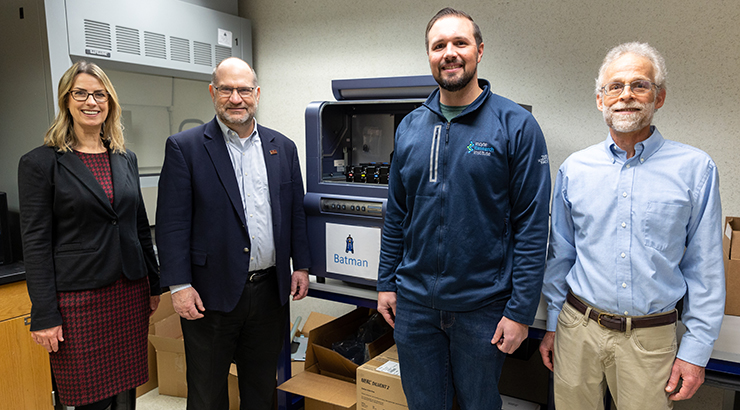Alumnus Aids in Donation of Cell Flow Cytometer to Biology Department

(L to R): Dr. Laurie McMillan, dean, College of Liberal Arts and Sciences; Dr. Kenneth S. Hawkinson, university president; Shane Harvey ’11; Dr. Matthew Junker, associate professor of chemistry
KUTZTOWN, Pa. – Kutztown University’s Department of Biology received a state-of-the-art donation of a cell flow cytometer, an advanced cell biology instrument from the pharmaceutical company, Incyte. The donation, valued at $200,000, was initiated by KU alumnus Shane Harvey ’11, who worked with the Wilmington, Del.-based company.
Harvey, who earned a Bachelor of Science from KU in 2011, was welcomed back to campus Friday, Feb. 9, by university president Dr. Kenneth S. Hawkinson. Harvey worked with Incyte to find a new home for its cell flow cytometer. Advanced cytometers are hard to find at undergraduate institutions, as brand-new equipment requires significant investment from universities. The equipment KU received was first purchased in 2016 for $425,000.
“This advanced cell flow cytometer will allow our students to get hands-on experience with a professional instrument and significantly extend the types of research projects we can do at KU,” said Dr. Matthew Junker, associate professor of chemistry. “This instrument will be a critical component to our future academic programming.”
A cell flow cytometer measures the characteristics of cells in a sample containing millions of cells. The power of the technique is that the instrument doesn’t measure an average signal from the sample, but rather measures a signal for each individual cell in the sample. This allows one to collect population-based statistics. This ability to rapidly measure millions of individual cells is achieved by the instrument pumping the sample so that cells “flow” in single file through a detector so that each cell is individually measured.
Furthermore, cell flow cytometers typically contain multiple detectors through which the cells flow, which enables the instrument to measure multiple characteristics of each cell. The data output can then be used to quantify how many cells within a given population have the different types of characteristics that were measured.
Cell flow cytometry can be used to determine such things as the number of different types of cells in a population, the number of cells responding to a certain stimulus (e.g., drug or antibody treatment) and the number of cells in a certain physiological state (growing, diseased, dying, etc.). The instrument is highly used in basic research and in the biotechnology and pharmaceutical industries.






